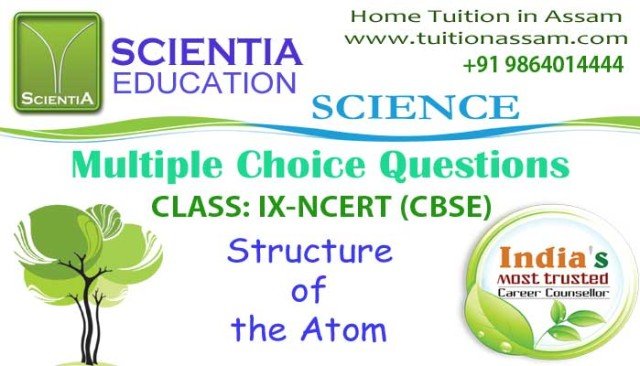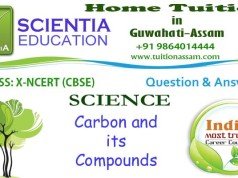
CLASS: IX NCERT (CBSE)
Chemistry
Structure of the Atom
Question (1): Almost the entire mass of an atom is concentrated in the__________.
1. proton
2. electrons
3. nucleus
4. neutrons
Ans: 3
Question (2): Electron was discovered by___________.
1. Chadwick
2. Thomson
3. Goldstein
4. Bohr
Ans: 2
Question (3): An atom has a mass number of 23 and atomic number 11. The number of protons are_________.
1. 11
2. 12
3. 23
4. 44
Ans: 1
Question (4): The mass of the atom is determined by________.
1. neutrons
2. neutron and proton
3. electron
4. electron and neutron
Ans: 2
Question (5): The K, L and M shells of an atom are full. Its atomic number is_______.
1. 18
2. 20
3. 10
4. 12
Ans: 1
Question (6): Which of the air pressures is appropriate for the production of cathode rays in the discharge tube?
1. 1 cm Hg
2. 1 mm Hg
3. 0.001 cm Hg
4. 0.001 mm Hg
Ans: 4
Question (7): Cathode rays are deflected towards__________.
1. positive electrode
2. negative electrode
3. both electrodes
4. none of the electrodes
Ans: 1
Question (8): The absolute charge of an electron is___________.
1. – 1.6 x 10-19C
2. + 1.6 x 10-19C
3. 1.6 x 10-19C
4. 16 x 10-19C
Ans: 1
Question (9): The proton is heavier than an electron by___________.
1. 1850 times
2. 1840 times
3. 1000 times
4. 100 times
Ans: 2
Question (10): Carbon-12 atom has_______________.
1. 6 electrons, 6 protons, 6 neutrons
2. 6 electrons, 12 protons, 6 neutrons
3. 12 electrons, 6 protons, 6 neutrons
4. 18 electrons, 6 protons and 6 neutrons
Ans: 1
Question (11): Chadwick got the Nobel Prize for the discovery of __________.
1. protons
2. neutrons
3. electrons
4. mesons
Ans: 2
Question (12): Mass number is equal to the_________.
1. number of protons + number of electrons
2. number of protons + number of neutrons
3. number of neutrons + number of electrons
4. number of electrons
Ans: 2
Question (13): The element X has 2 valence electrons. It is a____________.
1. metal
2. non-metal
3. metalloid
4. gas
Ans: 1
Question (14): The volume of the nucleus of an atom when compared to the extra nuclear part is_________.
1. bigger
2. smaller
3. same size
4. unpredictable
Ans: 2
Question (15): In Rutherford’s alpha-scattering experiment, a foil of element that was used _______________.
1. gold
2. silver
3. aluminum
4. magnesium
Ans: 1
Question (16): An element has an electronic configuration of 2, 8, 7. Its valency is
1. 1
2. 7
3. 17
4. 8
Ans: 1
Question (17): The other name of is _________
1. protium
2. tritium
3. deuterium
4. proton
Ans: 1
Question (18): During a chemical reaction, atomic number_________.
1. changes
2. remains same
3. changes and then is restored
4. changes alternately
Ans: 2
Question (19): The fixed circular paths around the nucleus are called_________.
1. orbits
2. orbitals
3. nucleons
4. mesons
Ans: 1














